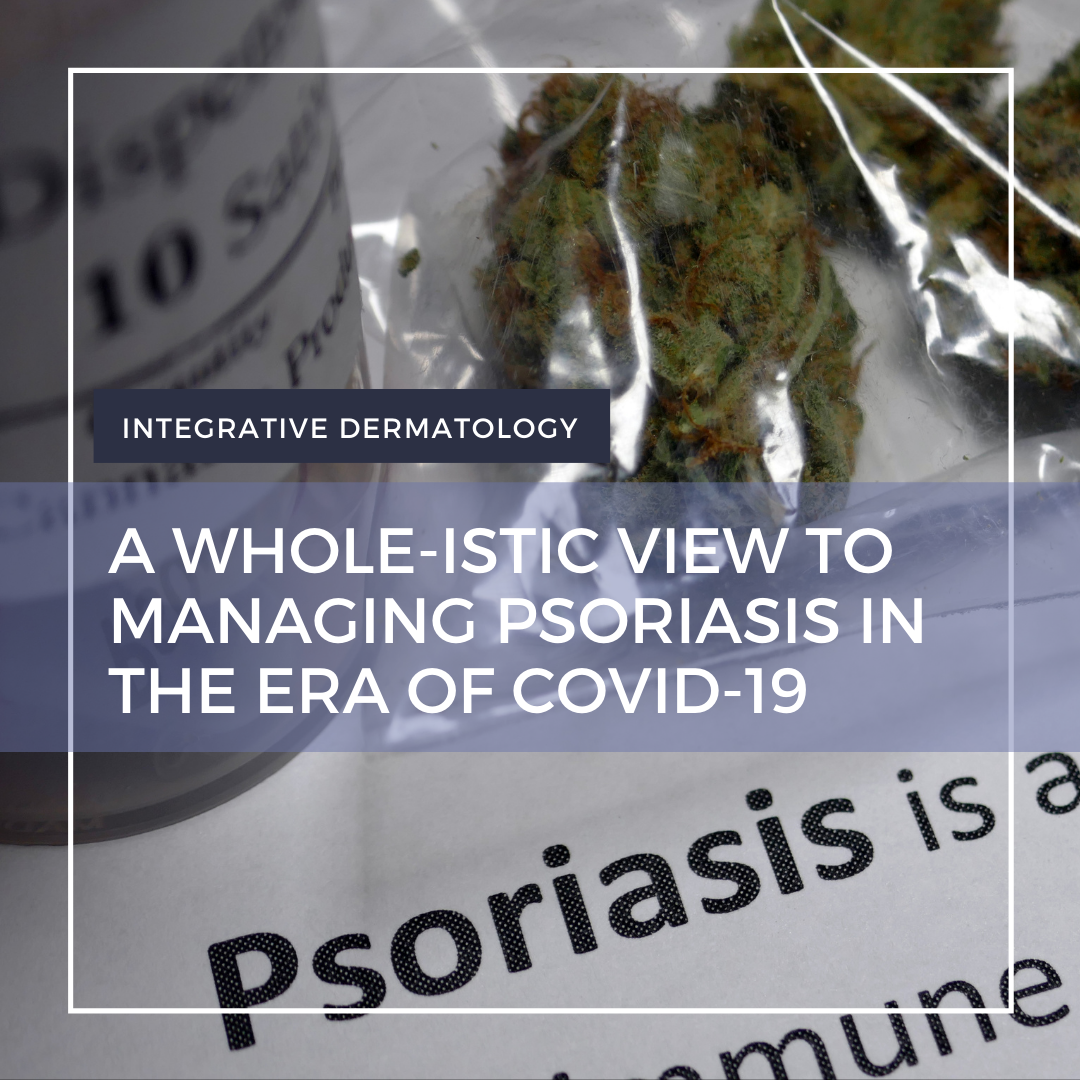As part of the recent 2020 Integrative Dermatology Symposium, Dr. Jason Hawkes, Associate Clinical Professor of Dermatology at UC Davis, provided a fantastically comprehensive primer on the management of psoriasis in the COVID-19 era. Read on for important treatment recommendations and insights to improve your clinical practice!
As an introduction, Dr. Hawkes emphasized that psoriasis remains a systemic inflammatory disease with multiple body surface areas of involvement. He cautions to look beyond the skin, as this inflammation is also directed inward, increasing the morbidity and mortality of the disease.
Far from involving only the body itself, Dr. Hawkes reviewed a multitude of emotional and psychological sequelae of psoriasis:
BODY AND SOUL: PSYCHOLOGICAL IMPACT OF DISEASE
-
- Decreased quality of life
- Personal financial costs
- Overall disease burden increases overall mortality (up to 5 years early death!)
- Burden on family members and subsequent feelings of guilt
- Increased rates of depression, anxiety, and suicide
- Poor sleep
- Chronic pain and/or itch (yes, itch!)
- Hawkes finds that itch may be a primary component of both erythrodermic and/or pustular psoriasis
Dr. Hawkes dove deep into the complex immunopathogenesis of psoriasis, stressing that it remains a bona fide T-cell mediated disease. While up to 31% of psoriasis patients manifest an HLA-C*602 (formerly HLA-Cw6) polymorphism, up to 50% of patients have an unknown genetic influence! Chronic plaque psoriasis remains the most common presentation, with guttate, inverse/flexural, pustular, and erythrodermic comprising the remainder of the subtypes. Dr. Hawkes opines that pustular and erythrodermic psoriasis may actually represent variants of the same presentation, as the pathogenesis is identical and one is rarely seen without the other.
Next, Dr. Hawkes again stressed the importance of screening for psoriasis-associated comorbidities, emphasizing the fact that Dermatologists can help to diagnose previously unrecognized systemic disease!
LOOK INWARD: PSORIASIS-ASSOCIATED COMORBIDITIES
-
- Non-alcoholic fatty liver disease (NAFLD) and cirrhosis
- encourage patients to maintain a healthy weight and diet, and consider checking the patient’s liver function and lipid panel
- Insulin resistance and diabetes
- Arthritis and osteoporosis
- perform a quick joint exam!
- Chronic kidney disease
- Gastrointestinal disease
- Cardiovascular disease, to include increased risk of atherosclerosis and stroke
- Non-alcoholic fatty liver disease (NAFLD) and cirrhosis
Dr. Hawkes stresses that obesity remains a frequent comorbidity of psoriasis and often results in poor treatment response and side effects from pharmacologic management. This is likely related to pro-inflammatory adipokines being produced by the excessive adipose tissue, and Dr. Hawkes comments that similar to cytokine-directed therapies, adipokines may represent a potential target for future therapies. Further, obesity commonly precedes pediatric psoriasis, and lifestyle counseling to parents and pediatric patients remains paramount.
So what specific recommendations can you make to your psoriasis patients to help avoid weight gain and obesity? Dr. Hawkes relates that a low-calorie (or low-sugar) diet may help to reduce disease severity, but that diet plus exercise trumps dietary management alone. A Mediterranean diet (one that emphasizes vegetables, fruits, herbs, nuts, beans, and whole grains) may have potential benefits, but a gluten-free diet is not beneficial unless the patient has true celiac disease. Of course, smoking cessation and moderation of alcohol intake also serve to reduce inflammation and vascular disease risk.
As psoriasis is a life-long disease, patients often ask about alternative or “natural” treatments for their disease. Dr. Hawkes encourages considering other non-pharmacologic or holistic therapies.
BROADEN YOUR HORIZON: OTHER INTEGRATIVE TREATMENTS FOR PSORIASIS
-
- Cannabis versus THC versus CBD-containing products (so hot right now!)
- The endocannabinoid system overlaps with the eicosanoid pathway for pain, representing a novel pathway for psoriasis-related pain
- Dermatologists must weigh the benefits (stress reduction, pain relief) versus the risks (increased diet-related obesity, CVD, and hepatotoxicity)
- Acupuncture
- May assist in arthritis-associated pain
- Physical therapy
- Help to maintain joint mobility, keeping patients active
- Massage, yoga, and meditation
- Valuable resources for stress reduction and overall mental health
- Cannabis versus THC versus CBD-containing products (so hot right now!)
Finally, Dr. Hawkes reviewed current treatment recommendations for psoriasis in the COVID-19 era, first emphasizing that there is no current evidence supporting an increased risk of COVID-19 infection in patients with psoriatic disease. He notes that traditional immunosuppressive systemic therapies theoretically increase the risk of all types of infection, COVID-19 included, but that this risk with newer biologic therapies is less well understood. Both the American Academy of Dermatology and the National Psoriasis Foundation do not recommend stopping systemic psoriasis therapy unless a patient develops a COVID-19 infection, at which time the risks and benefits of continuing therapy should be discussed.
Psoriasis remains a life-long disease, although the future remains bright for further targeted therapies. Dermatologists can play an important role not just in treating cutaneous manifestations, but also in incorporating therapies to treat the disease as a whole. Try incorporating this “WHOLE-listic” view with your psoriasis patients!
The above article was written by Dr. Matthew Willett, MD (DIRAC member) and represents his interpretation of the information presented by Dr. Jason Hawkes during his lecture “Comprehensive Management of Psoriasis in the Era of COVID-19: A WHOLE-listic View” at the 2020 Integrative Dermatology Symposium. Views expressed are those of Dr. Willett and do not reflect the official policy or position of the DON, DOD or USG.
Did you enjoy this article? Find more on Integrative Dermatology here.

